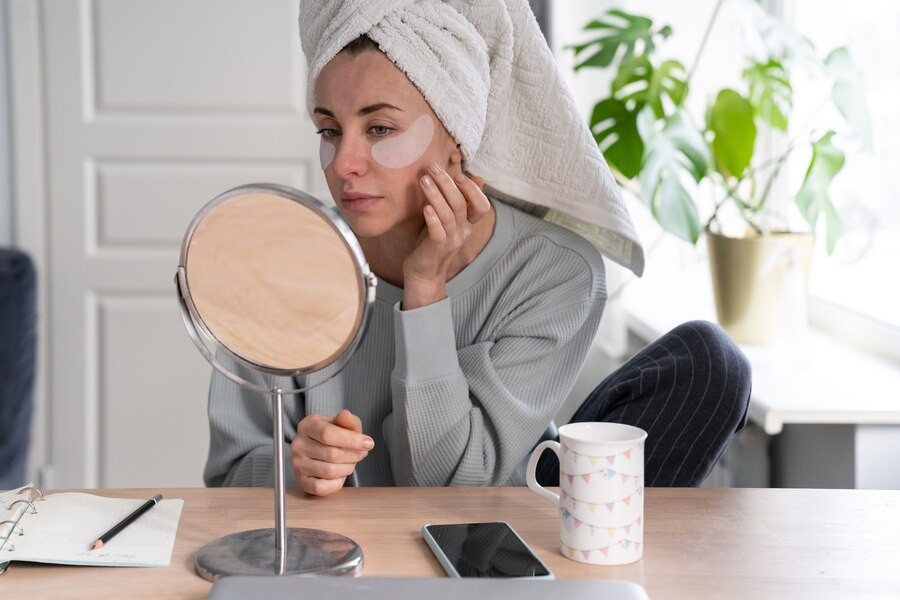Winter can be a challenging season for skin health. Cold air and indoor heating strip moisture from the skin as temperatures drop, leaving it vulnerable to dryness, irritation, and sensitivity. These conditions can worsen without proactive care, potentially leading to uncomfortable flakiness or even breakouts. Addressing winter dryness early isn’t just about comfort; it helps protect the skin’s natural barrier and maintain a balanced complexion.
By understanding the causes of winter dryness, adjusting skincare routines with the season in mind, and carefully altering indoor environments, you can keep your skin soft, hydrated, and healthy all season long.
How Winter Affects Dry Skin
Winter dryness is caused by a combination of cold, dry air outside and low humidity indoors. When temperatures fall, the air holds less moisture, leaving skin prone to drying out as it loses natural oils that keep it hydrated. Indoors, heating systems further reduce air moisture, creating an environment that saps even more water from the skin. This harsh, dry atmosphere can disrupt the skin’s natural barrier, leading to a cycle of dehydration and increased sensitivity.
For those prone to acne, dry skin in winter can be especially problematic. When the skin’s protective barrier weakens, it can trigger inflammation and lead to breakouts. Dry skin conditions can clog pores as the skin produces extra oil to compensate for lost moisture, often resulting in more blemishes. Paradoxically, dry skin can become excessively oily in winter without preventative skincare.
A tailored skincare routine can help balance hydration and keep acne under control during the colder months. Choosing products that strengthen the skin barrier and deliver deep hydration can effectively combat winter-related acne and dryness issues.
Winter Skincare Tips
It’s essential to adjust your routine based on your skin type to keep your skin hydrated and healthy in winter. Since skincare goes hand in hand with bathing, choose gentle, sulfate-free cleansers to remove impurities without irritating the skin. When bathing, use lukewarm water instead of hot and limit the time spent under the shower. These help keep your skin healthy and pliable without causing undue irritation that products can exacerbate.
Daily moisturizing is crucial for everyone, but choosing products tailored to your skin’s specific needs can make a significant difference in maintaining comfort and long-term health. First, you must determine your skin type and then select your skincare products accordingly.
Dry Skin
Winter is especially uncomfortable for people with dry skin, which can feel tight, flake, or even develop red, painful cracks. A rich, cream-based moisturizer with ingredients like squalane or shea butter provides deep hydration, while a gentle cream cleanser helps maintain moisture without over-drying. Applying a barrier cream or oil at night can also be beneficial for added protection.
Oily Skin
People with oily skin may find their skin produces less oil in winter but still craves hydration. Lightweight, gel-based moisturizers with non-comedogenic ingredients, such as hyaluronic acid or aloe vera, offer moisture without clogging pores. Cream cleansers can work well here, too, gently cleansing the skin without the drying effect of harsher cleansers, which can inadvertently stimulate more oil production.
Sensitive Skin
Winter commonly causes redness, irritation, and eczema-like skin cracking or flaking, but these are far more likely if you have sensitive skin. Seek out fragrance-free, hypoallergenic products with soothing ingredients like aloe vera or calendula. A gentle, non-foaming cleanser can help avoid further irritation, and a nourishing, fragrance-free moisturizer with ceramides will support the skin barrier, minimizing the effects of cold weather on delicate skin.
Managing Indoor Environment for Optimal Skin Health
Managing your home’s environment to control indoor humidity is essential for combating winter dryness. Simple, easy adjustments can help create a more humid and skin-friendly atmosphere at home.
Methods to make your indoor environment more hospitable for your skin include:
- Use a humidifier: Maintain indoor humidity levels between 40% and 60% to help retain moisture in the air. Doing so can keep your skin shining while benefiting your respiratory system.
- No humidifier? No problem: If a humidifier isn’t available, position bowls of water near heat sources to add humidity as the water evaporates.
- Maintain good air quality: Clean or replace air filters regularly, and ventilate rooms briefly by opening windows to reduce indoor pollutants that contribute to poor skin.
- Stay hydrated: Drink plenty of water throughout the day to support skin hydration from within and counteract the drying effects of winter heating.
Final Lines
Winter challenges the skin with harsh, dry conditions. Understanding your skin’s specific needs allows for targeted protection through strategic hydration and careful moisture management. A well-crafted routine can shield skin from cold-weather damage, maintaining its resilience when the thermometer starts to drop.

